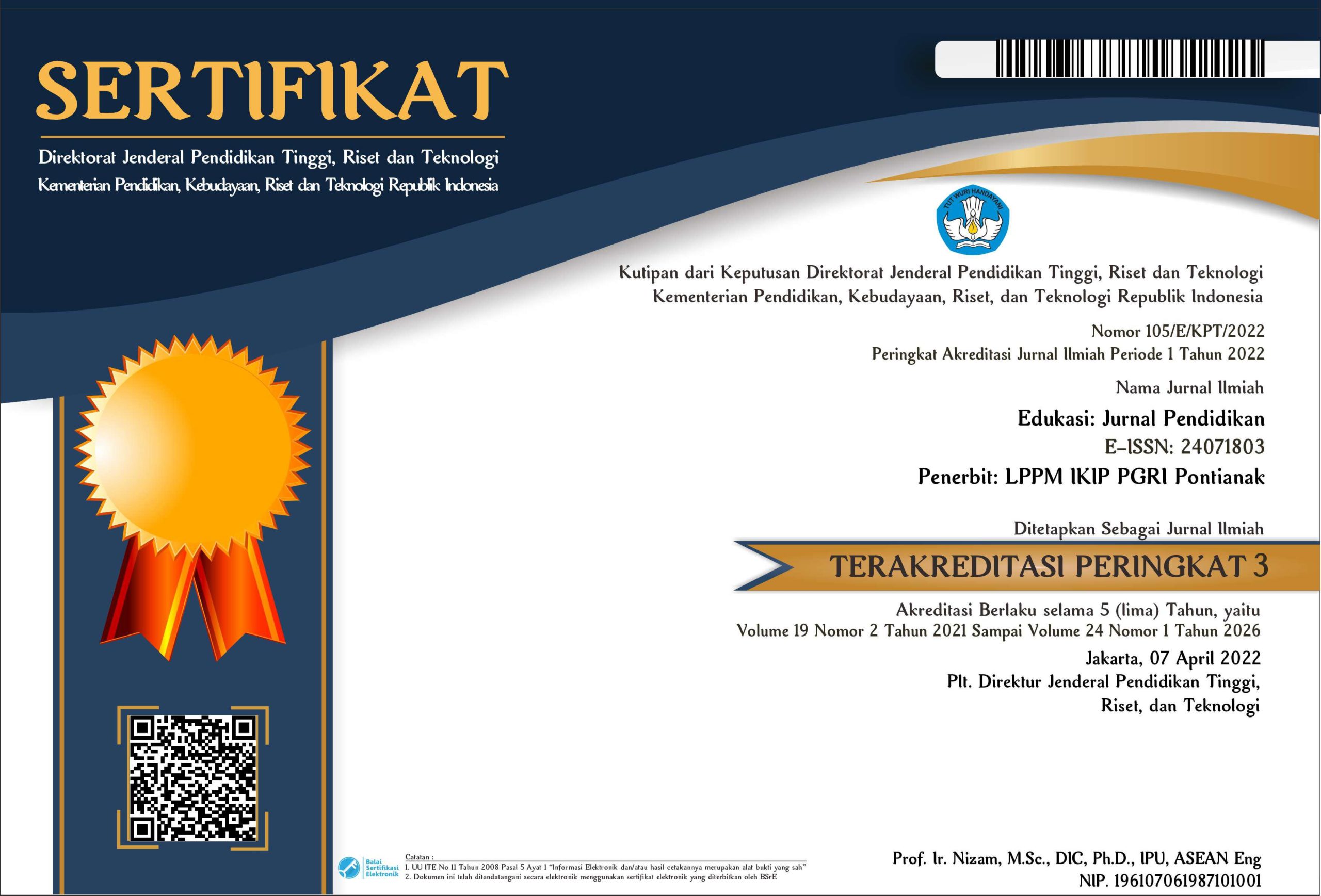Pengembangan Website “Sunting Pintar†sebagai Inovasi Pembelajaran Penyuntingan bagi Mahasiswa Berbasis Life Skill dan Entrepreneurship
DOI:
https://doi.org/10.31571/edukasi.v19i2.2927Keywords:
entrepreneurship, kecakapan hidup, website Sunting Pintar, life skill, Sunting Pintar websiteAbstract
Abstrak
Tujuan penelitian adalah mengembangkan media pembelajaran penyuntingan melalui aplikasi “Sunting Pintarâ€. Aplikasi tersebut merupakan laman interaktif yang digunakan dosen dan mahasiswa dalam pembelajaran penyuntingan. Laman terdiri atas tiga portal, yaitu admin (dosen), editor (mahasiswa), dan pengguna (masyarakat). Metode penelitian menggunakan constructivist instructional design yang terdiri atas 4 tahap, yaitu define, design, development, dan dissemination. Produk divalidasi oleh ahli bahasa dan praktisi untuk mengukur kelayakan dan kemudian diujicobakan pada mahasiswa. Responden uji coba sebanyak 30 mahasiswa yang mengikuti mata kuliah Penyuntingan dan 10 mahasiswa Jurusan Bahasa Melayu, Faculty of Humanities and Social Sciences, Yala Rajabhat University, Thailand. Teknik analisis data yang digunakan adalah deskriptif kualitatif. Berdasarkan hasil validasi dan uji coba, maka disimpulkan bahwa produk berada pada kategori layak untuk diimplementasikan dengan memperhatikan saran dari validator terkait penambahan konten materi penyuntingan dan ilustrasi gambar dalam aplikasi.
Â
Abstract
The purpose of this research was to develop editing learning media through the "Sunting Pintar" application. The application was an interactive page that was used by lecturers and students in learning editing. The page consists of three portals, namely admin (lecturer), editor (student), and user (community). This research method used constructivist instructional design which consists of 4 stages, namely define, design, development, and dissemination. The product was validated by linguists and practitioners to measure feasibility and then piloted on students. The trial respondents were 30 students who took the Editing course and 10 students of the Malay Language Department, Faculty of Humanities and Social Sciences, Yala Rajabhat University, Thailand. The data analysis technique used descriptive qualitative. Based on the results of the validation and testing, it was concluded that the product was in a feasible category to be implemented by taking into account the suggestions from the validator regarding the addition of editing material content and image illustrations in the application.
Downloads
References
Ahmad, T., Trihastuti, D., & Runtuk, J. (2013). Analisis Pengaruh Entrepreneurship Education terhadap Perilaku Entrepreneur Mahasiswa. Gema Aktualita, 2(1), 34-43. http://hdl.handle.net/123456789/54.
Arikunto, S. (2011). Prosedur Penelitian: Suatu Pendekatan Praktik. Jakarta: Rineka Cipta.
Boenisch, J. B. (2013). Defining and Describing Editing. Supporting Research Writing: Roles and Challenges in Multilingual Settings. New Delhi: Chandos Publishing.
Crompton, H., Lin, Y. C., Burke, D., & Block, A. (2017). Mobile Digital Games as an Educational Tool in K-12 Schools. Perspectives on Rethinking and Reforming Education, 16(2), 3-17.
Elenurm, T., Viia, K. T., Lassur, S., & Hansen, K. (2019). Opportunities of the Entrepreneurship Education for Enhancing Cooperation between Start-Up Entrepreneurs and Business Angels. International Journal of Entrepreneurship and Innovation, 38(3), 379-394.
Eneste, P. (2017). Buku Pintar Penyuntingan Naskah. Jakarta: Gramedia.
Herianto, E. (2013). E-Learning, Implementasi Teknologi di Era Belajar: Kajian pada Mata Kuliah Kurikulum PKN di Jurusan PIPS FKIP Universitas Mataram. Jurnal Pendidikan dan Pembelajaran, 20(1), 1-8.
KBBI. (2021). KBBI Daring dalam https://kbbi.kemdikbud.go.id/entri/ penyuntingan. Diakses 19 Juli 2021.
Lamrani, R., Abdelwahed, E. H., Chraibi, S., Qassimi, S., & Hafidi, M. (2018). Gamification and Serious Games Based Learning for Early Childhood in Rural Areas. New Trends in Model and Data Engineering, 9(1), 79-90.
Ludvigsen, K., Ness, I. J., & Timmis, S. (2019). Writing on the Wall: How the Use of Technology can Open Dialogical Spaces in Lectures. Thinking Skills and Creativity, 3(4), 1-18.
Maloney, J., & Liu, J. (2016). Review of Teaching Languages Online. Language Learning & Technology, 20(3), 37-39.
Margahana, H., & Triyanto, E. (2019). Membangun Tradisi Entrepreneurship pada Masyarakat. Edunomika, 3(2), 300-309. http://doi.org/10.29040/ jie.v3i02.497.
Miller, T. (2018). Developing Numeracy Skills Using Interactive Technology in A Play-Based Learning Environment. International Journal of STEM Education, 5(39), 1-11.
Nurhidayat, B., Wedi, A., & Praherdhiono, H. (2020). Pengembangan Multimedia Mobile Learning Berbasis Smartphone Android Materi Huruf Madura untuk SD Negeri 1 Parante Kebupaten Situbondo. JINOTEP: Jurnal Inovasi Teknologi Pembelajaran, 6(2), 103-110. http://dx.doi.org/10.17977/ um031v6i22020p103.
Peraturan Pemerintah Republik Indonesia Nomor 4 Tahun 2014 tentang Penyelenggaraan Pendidikan Tinggi dan Pengelolaan Perguruan Tinggi dalam https://lldikti7.ristekdikti.go.id/uploadperaturan/4.%20PP%204% 202014%20Penyelenggaraan%20Dikti%20dan%20Pengelolaan%20Dikti.pdf. Diakses 9 Agustus 2021.
Ranto, D. W. (2016). Membangun Perilaku Entrepreneur pada Mahasiswa melalui Entrepreneurship Education. JBMA: Jurnal Bisnis Manajemen dan Akuntansi, 3(1), 79-86.
Setiawan, A., Praherdhiono, H., & Sulthoni. (2019). Penggunaan Game Edukasi Digital sebagai Sarana Pembelajaran Anak Usia Dini. JINOTEP: Jurnal Inovasi Teknologi Pembelajaran, 6(1), 39-44. http://dx.doi.org/10.17977/ um031v6i12019p039.
Supriyana, A. (2018). Penyuntingan Aspek Kebahasaan dalam Naskah Berbahasa Indonesia. Arkhais, 9(2) 133-138.
Surahman, E., & Surjono, H. D. (2017). Pengembangan Adaptive Mobile Learning pada Mata Pelajaran Biologi SMA sebagai Upaya Mendukung Proses Blended Learning. Jurnal Inovasi Teknologi Pendidikan, 4(1), 26-37. https://doi.org/10.21831/jitp.v4i1.9723.
Thohari, A. N., Satoto, K. I., & Martono, K. T. (2013). Pembuatan Aplikasi Mobile Learning sebagai Sarana Pembelajaran di Lingkungan Universitas Diponegoro. Jurnal Teknologi dan Sistem Komputer, 1(2), 56-65. https://doi.org/10.14710/jtsiskom.1.2.2013.56-65.
Widiasworo, E. (2017). Inovasi Pembelajaran Berbasis Life Skill dan Entrepreneurship. Yogyakarta: Ar Ruzz Media.
Wirawan, P. W. (2011). Pengembangan Kemampuan E-Learning Berbasis Web ke dalam M-Learning. Jurnal Masyarakat Informatika, 2(4), 21-26.
Downloads
Published
How to Cite
Issue
Section
License
Authors who publish in this journal agree to the following terms:
- Authors retain copyright and grant the journal the right of first publication with the work simultaneously licensed under a Creative Commons Attribution License (CC-BY-NC) that allows others to share the work with an acknowledgment of the work's authorship and initial publication in this journal.
- Authors are able to enter into separate, additional contractual arrangements for the non-exclusive distribution of the journal's published version of the work (e.g., post it to an institutional repository or publish it in a book), with an acknowledgment of its initial publication in this journal.
- Authors are permitted and encouraged to post their work online (e.g., in institutional repositories or on their website) prior to and during the submission process, as it can lead to productive exchanges, as well as earlier and greater citation of published work.

 Download: 373
Download: 373


















